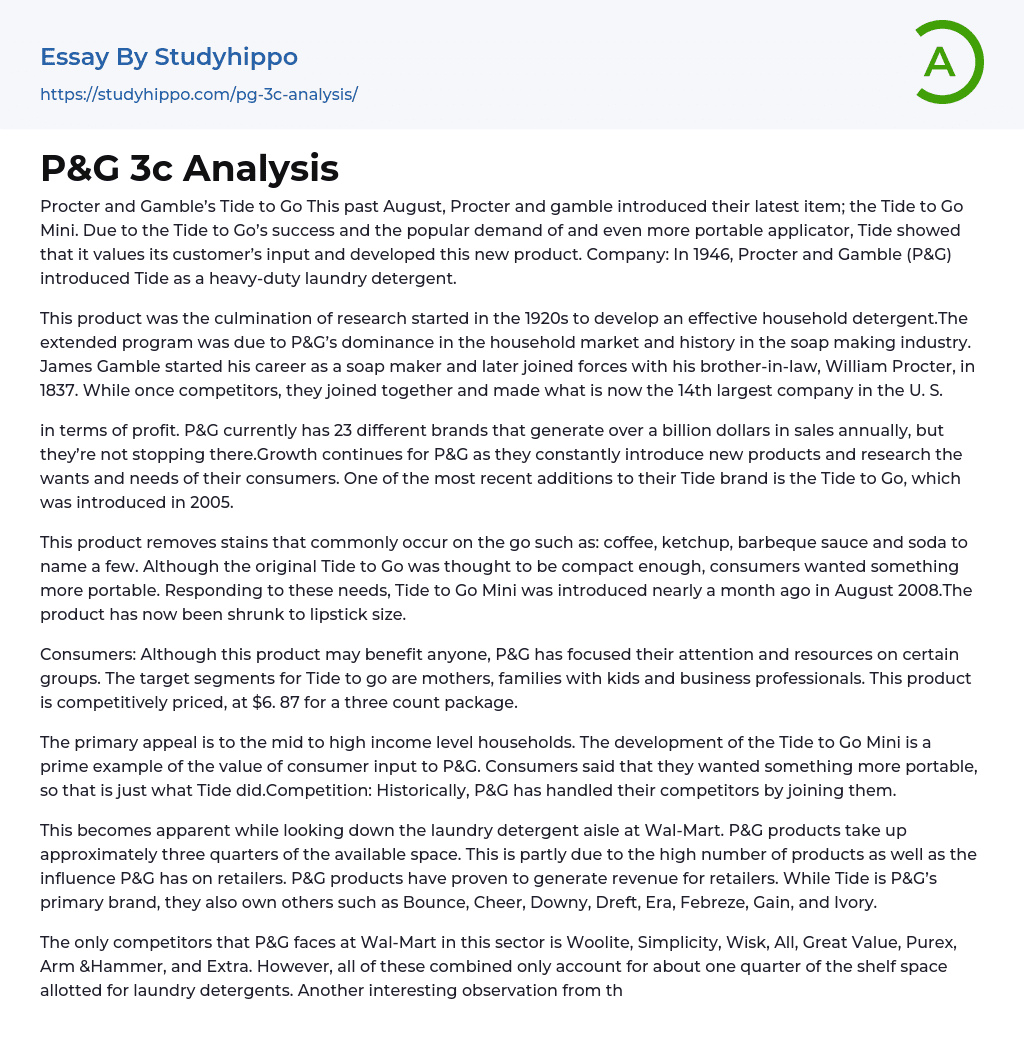Procter and Gamble’s Tide to Go This past August, Procter and gamble introduced their latest item; the Tide to Go Mini. Due to the Tide to Go’s success and the popular demand of and even more portable applicator, Tide showed that it values its customer’s input and developed this new product. Company: In 1946, Procter and Gamble (P&G) introduced Tide as a heavy-duty laundry detergent.
This product was the culmination of research started in the 1920s to develop an effective household detergent.The extended program was due to P&G’s dominance in the household market and history in the soap making industry. James Gamble started his career as a soap maker and later joined forces with his brother-in-law, William Procter, in 1837. While once competitors, they joined together and made what is now the 14th largest company i
...n the U. S.
in terms of profit. P&G currently has 23 different brands that generate over a billion dollars in sales annually, but they’re not stopping there.Growth continues for P&G as they constantly introduce new products and research the wants and needs of their consumers. One of the most recent additions to their Tide brand is the Tide to Go, which was introduced in 2005.
This product removes stains that commonly occur on the go such as: coffee, ketchup, barbeque sauce and soda to name a few. Although the original Tide to Go was thought to be compact enough, consumers wanted something more portable. Responding to these needs, Tide to Go Mini was introduced nearly a month ago in August 2008.The product has now been shrunk to lipstick size.
Consumers: Although this product may benefit anyone, P&G has focuse
their attention and resources on certain groups. The target segments for Tide to go are mothers, families with kids and business professionals. This product is competitively priced, at $6. 87 for a three count package.
The primary appeal is to the mid to high income level households. The development of the Tide to Go Mini is a prime example of the value of consumer input to P&G. Consumers said that they wanted something more portable, so that is just what Tide did.Competition: Historically, P&G has handled their competitors by joining them.
This becomes apparent while looking down the laundry detergent aisle at Wal-Mart. P&G products take up approximately three quarters of the available space. This is partly due to the high number of products as well as the influence P&G has on retailers. P&G products have proven to generate revenue for retailers. While Tide is P&G’s primary brand, they also own others such as Bounce, Cheer, Downy, Dreft, Era, Febreze, Gain, and Ivory.
The only competitors that P&G faces at Wal-Mart in this sector is Woolite, Simplicity, Wisk, All, Great Value, Purex, Arm &Hammer, and Extra. However, all of these combined only account for about one quarter of the shelf space allotted for laundry detergents. Another interesting observation from the Wal-Mart laundry detergent aisle is that Tide is located closest to the main aisle and the prices of the different detergents decreases while moving towards the center of the aisle. We believe this strategy is used to generate more revenue because the most expensive products are seen first.Within the P&G laundry detergent line, there is a spectrum of prices, with Tide being at the top.
P&G
competitors overall are less expensive than the P&G products. The competitors are competing by only price in this situation. Currently, Tide to Go is the only of its kind. There are other stain removing products, but there are not any other non-bleach products available in a portable pen-like applicator. It is almost certain though that some of the P&G competitors will begin to develop their own version of the Tide to Go.
However, Tide has the advantage of being the original and the aggressive marketing advertisements will likely have a positive effect on their future market share. By inventing new products like Tide to Go and improving old products, P&G has shown to be a leader in their market. Tide to Go was sparked by consumer demands which showed the customers that P&G values their input. History shows that if a competitor enters the Tide to Go market that P&G has the tools and experience to adapt to the market change. Tide to Go Mini is continuing Tides legacy as a successful invention.
- Wal-Mart essays
- Discover essays
- Brand Equity essays
- Branding essays
- Nike, Inc. essays
- Market share essays
- Razor essays
- Chief Executive Officer essays
- Convenience Store essays
- Firm essays
- Training And Development essays
- Unilever essays
- Variable Cost essays
- Virgin Group essays
- Bargaining essays
- Entity essays
- Pest analysis essays
- Advertisement essays
- Advertising essays
- Anheuser-busch essays
- Audience Theory essays
- Brand essays
- Brands essays
- Competitor Analysis essays
- Consumer essays
- Detergent essays
- Marketing Management essays
- Marketing Mix essays
- Marketing Plan essays
- Marketing Research essays
- Marketing Strategy essays
- New Product Development essays
- Point Of Sale essays
- Price essays
- Procurement essays
- Product essays
- Product Differentiation essays
- Product Placement essays
- Promotion essays
- Promotion And Marketing Communications essays
- Research Design essays
- Retailing essays
- Trademark essays
- Board Of Directors essays
- Brand Management essays
- Business Ethics essays
- Business Management essays
- Change Management essays
- Comparative Analysis essays
- Decision Making essays




